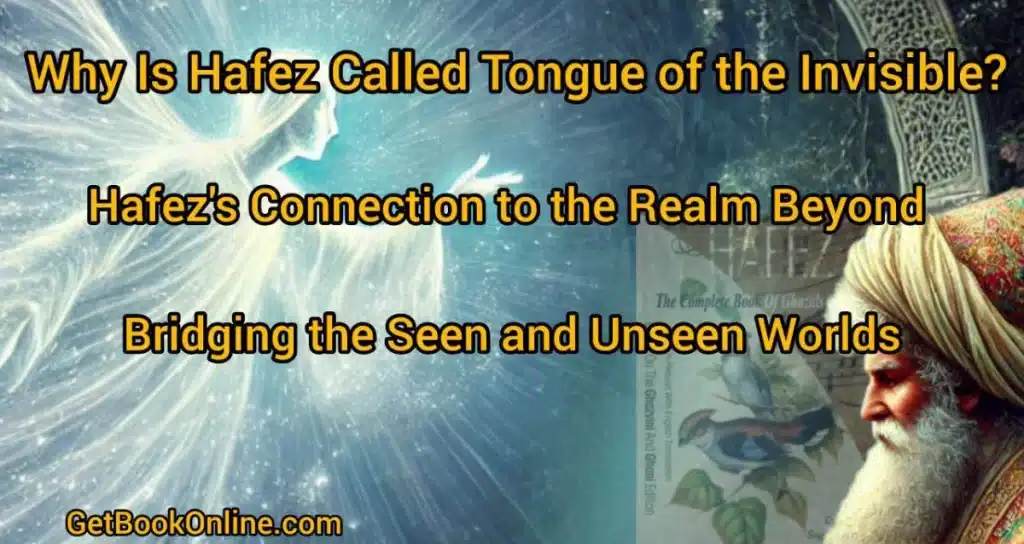Update Date: January 5, 2025
Have you ever wondered why the title “Tongue of the Invisible” is attributed to Hafez, the celebrated Persian poet? What hidden layers of meaning lie beneath this intriguing label? What is the significance behind Hafez being called the Tongue of the Unseen? Why is Hafez often considered a messenger of the unseen through his poetry?
Hafez Shirazi, one of the most famous poets in Persian literature, is often celebrated for his profound mysticism and timeless wisdom. Among the many titles attributed to him, one title stands out in particular: “Tongue of the Invisible.” This title is not a simple poetic expression, but a reflection of Hafez’s extraordinary ability to bridge the gap between the material world and the unseen realms of spiritual insight. His poetry, rich in metaphor and symbolism, touches on themes of divine love, the mysteries of existence, and the deeper truths of the universe, making him a figure whose words transcend time and place.
The phrase “Tongue of the Invisible” encapsulates the essence of Hafez’s literary genius—his ability to convey the wisdom of the unseen through the beauty of language. For centuries, people have turned to his Divan for guidance, especially through the practice of Fal-e Hafez or divination, seeking answers to life’s most profound questions. This connection to the mystical and divine has cemented Hafez’s place not only in Persian culture but also in global literary traditions.
In this article, we explore why Hafez is revered as the “Tongue of the Unseen,” delving into the historical, spiritual, and cultural significance of this iconic title. Through examining his life, works, and the lasting impact of his poetry, we uncover how Hafez’s words continue to inspire and guide people across the world, bridging the visible and invisible worlds in a way only a true mystic can.
The Historical Roots of the Title Tongue of the Unseen
The title “Tongue of the Invisible” holds a special place in Iranian history and culture and is uniquely associated with Hafez Shirazi, the celebrated Persian poet. The origins of this title can be traced back to historical events during Hafez’s life and the unique status of his poetry. One of the most prominent stories tied to this title occurred after Hafez’s death.
According to historical accounts, certain religious individuals of the time, misinterpreting Hafez’s poetry, argued that he was not worthy of burial in sacred grounds. To resolve this dispute, the community decided to seek guidance through Fal-e Hafez (a form of divination) using Hafez’s own Divan (collection of poetry).
A child from the crowd opened the book, and a verse emerged that convinced the opponents to allow Hafez’s burial in Shiraz. It is the verse that answered people:
عیب رندان مکن ای زاهد پاکیزهسرشت
که گناه دگری بر تو نخواهند نوشت
This incident reinforced the belief that Hafez’s poetry was divinely inspired, earning him the title “Tongue of the Invisible,” symbolizing his role as a voice for hidden truths and mystical insights.
This story highlights the significant cultural and spiritual influence of Hafez’s Divan, even during his time. People believed that his poetry connected them to a higher realm of understanding. Thus, the title not only underscores the spiritual essence of Hafez’s poetry but also reflects his profound cultural and social influence.
Even today, Iranians turn to Hafez’s Divan as a spiritual and cultural guide, often seeking its wisdom during challenging times. This deep connection has immortalized Hafez as a timeless figure in Persian literature, with the title “Tongue of the Invisible” serving as a testament to his extraordinary influence.
The Mystical Meaning of the Title “Tongue of the Invisible”
The title “Tongue of the Invisible” goes beyond being a mere designation for Hafez Shirazi—it symbolizes the profound mystical and spiritual depth of his poetry. In Persian mysticism, the term “Invisible” refers to the hidden and sacred realm of truth, inaccessible to ordinary senses or logic. Through his unique use of symbolic language, metaphor, and ambiguity, Hafez explores themes that inspire readers to reflect on the nature of existence, divine love, and humanity’s connection to the unseen.
ما درس سحر در ره میخانه نهادیم
محصول دعا در ره جانانه نهادیم
Hafez’s poetry stands out as a bridge between the physical and metaphysical realms. His verses are filled with references to higher realities and divine mysteries, expressed in a manner that resonates universally. His work reflects the essence of a poet who is also a mystic, capable of articulating spiritual concepts in a way that touches the hearts of readers across generations.
One of the distinctive features of Hafez’s poetry is its multi-layered interpretation. Each verse of his Divan holds the potential to convey unique meanings to different readers, depending on their perspective and circumstances. This versatility has made Hafez’s work an inexhaustible source of spiritual and philosophical inspiration, cherished by mystics, philosophers, and ordinary readers alike.
Thus, the title “Tongue of the Invisible” aptly captures Hafez’s unparalleled ability to express complex mystical ideas in a simple, elegant, and relatable manner. It is this rare gift that has solidified his place in Persian literature and earned him a revered position in Iranian mysticism and culture.
Hafez’s Divan and the Tradition of Fa’al (Divination)
Divination with Hafez’s Divan is one of the most ancient and widespread cultural traditions in Iran. People in Iran, and even admirers of Hafez across the world, consult his Divan during special occasions or challenging moments in their lives. They believe that Hafez’s poetry can provide guidance from the unseen world and offer answers to their questions or solutions to their problems.
This tradition dates back to Hafez’s era and has continued uninterrupted to the present day. Numerous stories have been passed down, highlighting how individuals found solace or solutions during their most difficult times through fa’al with Hafez’s Divan. For instance, during Yalda Night, Iranians open the Divan of Hafez and read his poetry aloud, seeking hope and light for themselves and their loved ones.
The success of fa’al with Hafez’s poetry lies in the multi-layered nature of his language, rich with ambiguity and symbolism. Each verse can resonate differently with individuals depending on their specific circumstances and mindset. This unique quality has elevated Hafez’s Divan to the status of a “second sacred book” for many Iranians.
The practice of fa’al with Hafez reflects the deep spiritual connection between the people and his poetry. It also demonstrates their faith in the divine inspiration behind Hafez’s poetic expressions. This enduring tradition further strengthens Hafez’s title as the “Tongue of the Invisible,” showcasing his unique ability to connect readers with the unseen realms of guidance and insight.
Hafez in Global Culture
Hafez Shirazi is not merely an Iranian poet; he is a global figure celebrated for his contributions to literature and culture across the world. His works have been translated into numerous languages, and intellectuals from various countries have expressed admiration for his genius.
In the West, Johann Wolfgang von Goethe, the renowned German poet, was one of Hafez’s most ardent admirers. Goethe drew inspiration from Hafez in his West-Eastern Divan, often considering Hafez his equal and spiritual companion. Hafez’s poetry is studied in prestigious universities worldwide, and scholars continue to explore its mystical and literary significance.
The global appeal of Hafez lies in the universal themes of his poetry: love, freedom, justice, and spirituality. These topics transcend cultural and temporal boundaries, resonating with people from diverse backgrounds. Hafez’s ability to convey profound truths through symbolic and evocative language has allowed his works to touch the hearts of readers worldwide.
This widespread influence and admiration highlight the depth of Hafez’s artistic and intellectual contributions. As a result, the title “Tongue of the Invisible” not only reflects his significance in Iranian culture but also underscores his enduring impact on global literature and thought.
Seek Guidance from the Tongue of the Invisible
The title “Tongue of the Invisible” is a powerful symbol of the depth and universality of Hafez’s poetry. It signifies his exceptional ability to articulate ideas that transcend human understanding, bridging the gap between the material and spiritual realms. Hafez’s poetry has inspired countless individuals throughout history and continues to do so today.
By employing symbolic language and addressing timeless themes, Hafez has surpassed geographical and temporal boundaries to become one of the most enduring figures in world literature. The title “Tongue of the Invisible” reflects this elevated status, cementing Hafez’s place as a unique and unparalleled figure in Persian and global literary history.
Frequently Asked Questions
What inspired the title “Tongue of the Invisible” for Hafez?
The title reflects Hafez’s unique ability to express the intangible aspects of human experience through his poetry. He is a conduit for conveying emotions, thoughts, and truths that often remain unseen.
How does Hafez’s poetry transcend language barriers?
Hafez’s use of metaphor and symbolism makes his poetry universally relatable. While his verses are in Persian, his themes and emotions resonate across cultures and languages.
How does Hafez’s poetry resonate with modern readers?
Hafez’s exploration of universal themes such as love, spirituality, and the human condition makes his poetry timeless. Modern readers still find relevance and insight in his verses.
Is the “Tongue of the Invisible” concept unique to Hafez?
While Hafez is often associated with this concept, similar ideas of art as a vehicle for expressing the unseen can be found in the works of other poets and artists across cultures.

